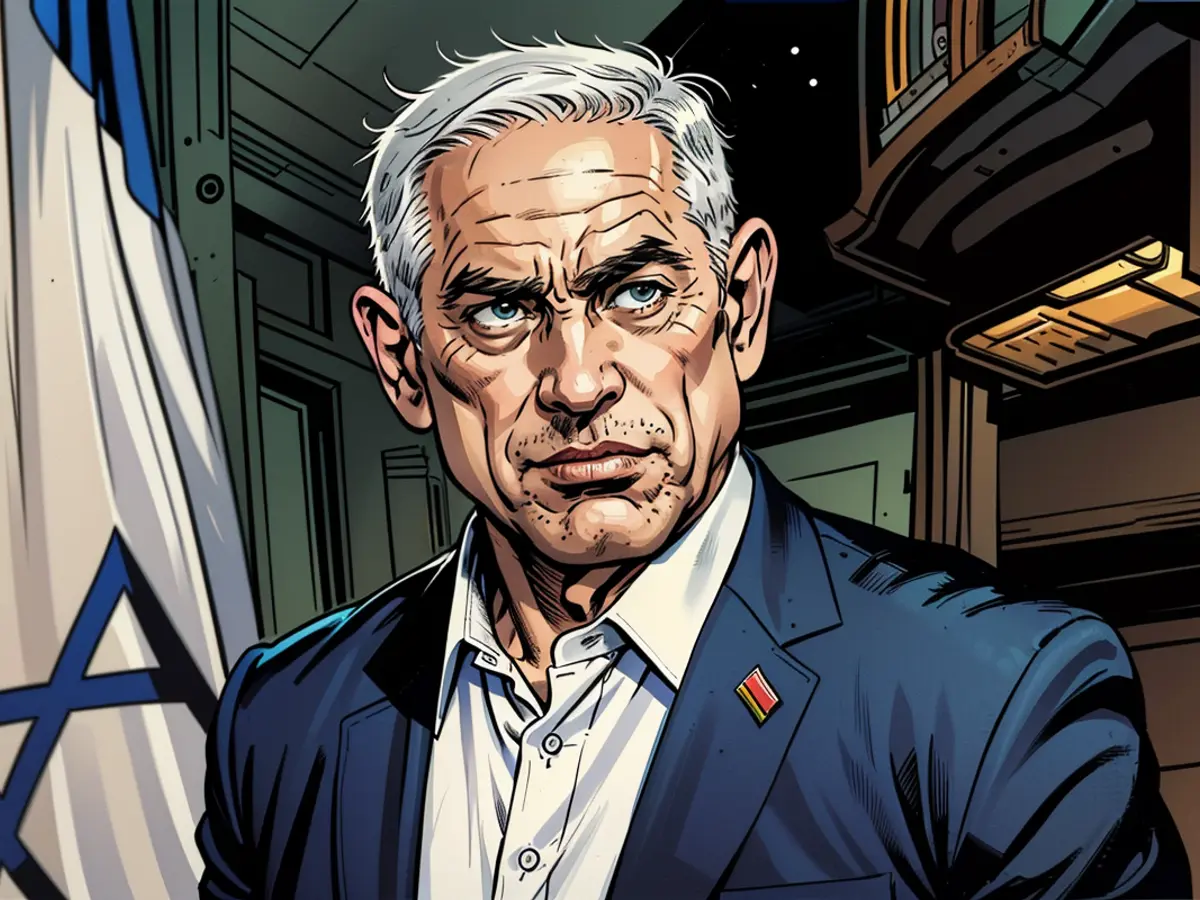Amidst Israel intensifying conflicts on various fronts, there's uncertainty surrounding Prime Minister Netanyahu's ultimate objective.
A week after Sinwar's demise, it's becoming increasingly apparent that they were mistaken.
Netanyahu, celebrating his 75th birthday recently, is Israel's longest-serving prime minister, leading his nation through its longest-ever conflict.
International allies, along with numerous individuals within the country, are urging Netanyahu to conclude this war immediately. They highlight that Sinwar's death occurred following other military victories, notably the killing of Hezbollah leader Hassan Nasrallah.
However, Netanyahu has declared his intention to continue fighting, leaving the world in suspense as to his ultimate objective.
He hints at aspirations beyond vanquishing Hamas and Hezbollah, Israel's two primary threats. He claimed Nasrallah's killing was a "necessary step" towards altering "the regional power balance for years to come," causing concerns about his willingness to engage Israel directly with Iran.
Israel and Iran are teetering on the brink of another significant escalation, following Iran's massive ballistic missile assault against Israel on October 1st.
Netanyahu swiftly promised retaliation, but three weeks later, the world still waits for Israel's next move. The US and other allies have called for Netanyahu to exercise restraint and avoid targeting Iran's nuclear and oil assets, but it's unclear if they were successful.
Netanyahu has openly stated his military's desire to eradicate Iran's proxies posing the most immediate threat to Israel: Hamas in Gaza and Hezbollah in southern Lebanon. However, it's becoming increasingly clear that this may be unattainable.
The situation in northern Gaza exemplifies this. Israel's military has withdrawn from the region twice after claiming to have defeated Hamas there, only to return again after observing signs of Hamas' reemergence in the area.
Northern Gaza has once again become a war's epicenter, with the IDF inflicting significant suffering on people who returned to their homes following the last Israeli withdrawal.
Meanwhile, in Lebanon, Hezbollah continues to strike. A drone infiltrated Israeli air defenses over the weekend, striking Netanyahu's beach house over 50 miles from the Lebanese border. On Monday, another drone managed to penetrate Israeli air defenses, striking Netanyahu's beach house in the coastal city of Caesarea, over 50 miles from the Lebanese border.
Netanyahu's reluctance to negotiate a ceasefire agreement, even after securing several military victories, has sparked outrage in Israel. Weekly mass demonstrations against him and his government are resurfacing, demanding an agreement with Hamas that would secure the release of the 101 hostages still imprisoned in Gaza.
Aviv Bushinsky, a former Netanyahu advisor and spokesperson who now serves as a political analyst, underscores the hostages' fate as crucial for Netanyahu's future legacy.
“If Netanyahu fails to release any more hostages, either via military or diplomatic means, the people will say he's failed. They will remember the Netanyahu proposal in July, where at the last moment, he added several more conditions to the ceasefire agreement, effectively negating the deal,” he said.
Bushinsky informed CNN that if the war ends without any further hostages or bodies being released or rescued, some people might start questioning Sinwar's elimination – an action celebrated universally in Israel last week.
“And this is my greatest fear – that people will say, ‘you see, we made a mistake in eliminating the one individual we could negotiate with. What if something had happened? At least we had a point of contact’,” he concluded.
“No motivation to end the conflict”
Netanyahu is navigating a complex scenario, attempting to cater to the conflicting demands of his numerous indispensable allies.
His government is reliant on the support of extremist figures such as Security Minister Itamar Ben-Gvir and Finance Minister Bezalel Smotrich, who openly support Israel's continued occupation of Gaza and even advocate for the establishment of Jewish settlements there.
Netanyahu's approval ratings have surged over the past year, but not enough for him to challenge new elections and secure victory. Thus, he is stuck.

“Ending the Gaza conflict and the Lebanon conflict is not an option for his political allies in the coalition. They want to press ahead, so he cannot bring the conflict to a close with the current coalition,” said Gayil Talshir, a political scientist at the Hebrew University in Jerusalem.
“The typical Netanyahu we've known for the past 15 years would have probably opted for a national unity government and a broad ceasefire agreement with US backing. But this is not the political landscape we are currently experiencing. Hence, politically, with this coalition, he has no motivation to end the conflict,” she added.
Talshir explained that a broader national unity government is not an option for Netanyahu since it would likely result in a public inquiry, led by a judge, into the failures leading to the October 7 attacks.
Furthermore, Netanyahu is still being tried for several charges of fraud, breach of trust, and bribery. He is set to testify in December – the first sitting Israeli prime minister to stand trial as a defendant.
Prior to the October 7 terror attacks, Netanyahu and his administration attempted to push through a controversial judicial reform, granting significant power over the courts to the government, potentially empowering Netanyahu to influence his own trial. A national unity government would not permit this, Talshir stated.
Sure, here's a paraphrased version of your text:
Simultaneously, Netanyahu must take into account the demands coming from the US. The Biden administration has made it crystal clear that they want Israel to work towards a settlement that would put an end to the conflict.
On Tuesday, US Secretary of State Antony Blinken paid a visit to Israel, urging Netanyahu and his administration to take further steps to lessen the tension.
However, Netanyahu appears to be growing more resistant to the pressures from the US. Blinken's visit this week marks his 11th trip to the Middle East in a year, yet like the previous visits, it seems to have yielded minimal results.
The strained relationship between Netanyahu and US President Joe Biden is well-known, but it's expected to worsen in the coming days.
With the US election looking uncertain, Biden needs to carefully navigate his approach towards Israel to avoid alienating Vice President Kamala Harris's supporters. He needs to appear tough on the alarming humanitarian crisis in Gaza to prevent Arab-Americans and progressives from deserting his party over the conflict in Gaza. Yet, he must also continue to support Israel to avoid upsetting moderate and Jewish voters who expect the US to stand by Israel no matter what.
“The American elections play a significant role in how Netanyahu views the future,” Talshir told CNN. “He has a brief window of opportunity because there's little chance that Biden can restrain Netanyahu now. But after November 5, things will change,” she added.
She suggested that regardless of who wins the election, the Biden administration may exert more pressure on Israel to end the conflict in the two months between the election and the inauguration of the new US president.
Biden has already hinted at increasing the pressure – warning Israel that the US might halt the supply of weapons unless the humanitarian situation in Gaza improves.
“Netanyahu understands that there is no grand victory awaiting him after that, because both Sinwar and Nasrallah are no more. So the question is whether he wants to wait for Trump to get re-elected and secure a major defense alliance between the US, Saudi Arabia, and Israel, which will be more likely under Trump,” Talshir said, adding that such an alliance would provide Netanyahu with a significant political boost at home.
“He is the head of state of Israel at a time when the country is at its most vulnerable since its establishment. The further he moves away from October 7, and the more military victories he achieves, the more likely he is to emerge victorious,” she said.
For Netanyahu, the goal is to establish a legacy as the prime minister who saved Israel. If he manages to achieve that, he might even consider stepping down, Bushinsky suggested.
“Most people think that he won’t, but I’ve worked with him, and I’ve seen him pass on the opportunity of becoming prime minister in 2001. Maybe he has changed, but if he can emerge as a hero, someone who has carried out a Churchillian act for the State of Israel, he might think it's time to call it a day,” he said.
“And then, his mission would be to negotiate a deal with the prosecution. Maybe they'll let him go, and he'll be able to travel abroad, give lectures as the one who defeated terror. If he doesn't have a criminal record, he'll be able to join various advisory boards and earn a lot of money, which he feels he's been missing out on.”

Despite the international pressure and calls for a ceasefire, Israel's Prime Minister Netanyahu continues to maintain his stance, citing the need to address the threats posed by Hezbollah and Hamas in the Middle East. The world watches with bated breath as Israel's conflict with its adversaries in both Gaza and Lebanon continues, with no apparent motivation for resolution from Netanyahu's side. This prolonged conflict has significant implications not only for the Middle East but also for Israel's international standings and relations.







